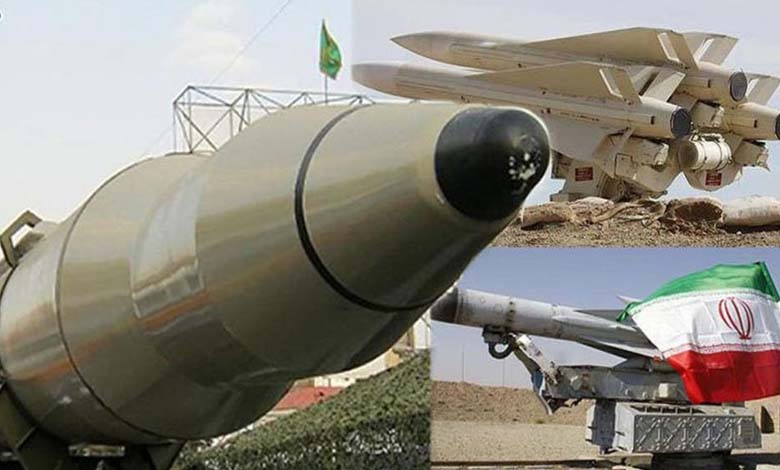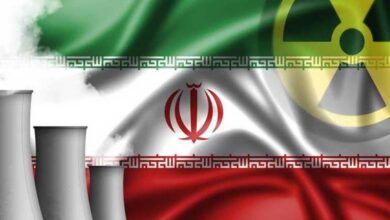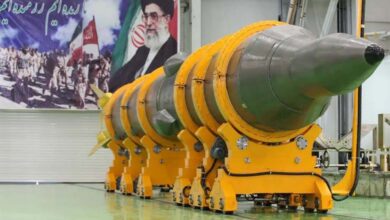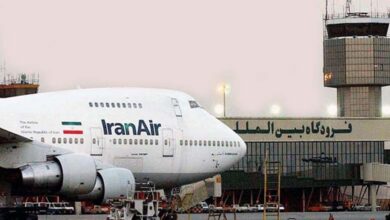“Telegraph”: Iran May Feel That Building a Nuclear Bomb Is Its Only Option Now

Politics in the Middle East has seemed, for a year, like the most dangerous casino in the world, with Hamas, Hezbollah, and Israel taking turns spinning the roulette wheel.
-
A $7 Million Bounty on Its Leader: What Is Hezbollah’s Most Dangerous Unit, “The Shadow Unit”?
-
Hezbollah Faces Two Choices After Nasrallah’s Assassination: Crushing Retaliation or Defeat
On Tuesday evening, Iran made its biggest gamble yet by launching around 200 ballistic missiles at cities across Israel, an attack that could be the start of a regional war threatening global security, according to an analysis by the British Daily Telegraph written by Middle East expert Adrian Blonfield.
Over the past two weeks, Iran has found itself in a predicament. Its main proxy, Hezbollah, has been largely incapacitated—at least for now—due to Israel’s remarkably successful military and intelligence campaign in Lebanon.
-
Gaza Setback and the Success of Israeli Spies: An Analysis of Hezbollah Infiltration
-
Can Hezbollah stand up to Israel? Iranian President expresses doubts
Thus, the Israeli attack left Tehran facing a difficult choice. By doing nothing, the regime risks losing its standing in the Middle East, damaging its image among Shiites in the region, and jeopardizing its ambitions.
However, retaliation carries the risk of a full-scale war with a technologically superior adversary, a war that could draw in the United States. Such a trend, as perceived by pragmatists within the Iranian government, could ultimately threaten the country’s nuclear program and possibly even topple the regime itself.
-
Troubles and Crises: International Economy Affected by Iran and Israel Events
-
Will Iran Abandon Its Revenge Against Israel in Exchange for a Gaza Ceasefire?
Tehran’s response on Tuesday evening indicated that it was seeking a moderate solution by striking Israel with enough force to appease local and Lebanese Shiite public opinion, but without causing significant damage that would provoke a widespread Israeli counter-strike.
On the Edge of Danger
However, it is highly probable that Iran has achieved the worst of both worlds: doing too little to regain the confidence of Shiites in its leadership while simultaneously giving Benjamin Netanyahu, the Israeli Prime Minister, the opportunity he has long awaited, according to the Daily Telegraph.
-
Leaks from the Secret Meeting: Iran Refuses to Support Hezbollah and its Iraqi Militias Against Israel
-
Intense Cyber War Between Israel and Iran
In fact, the Iranian missile attack has somewhat calmed Shiite sentiments. Shouts of “Allahu Akbar” could be heard from rooftops in several areas of Tehran, while jubilant Shiites fired into the air in Beirut in celebration. But for many, this was just the beginning.
Nonetheless, “Israel is unlikely to be shocked or awed,” as its defenses intercepted the vast majority of Iranian missiles, some of which fell into the sea without causing damage, according to the British newspaper.
-
Washington Tests Military Capabilities Amid Escalation Between Israel and Iran
-
Israel Caught Between Rafah and Iran.. Will it Break the Pressure Barrier?
So far, only one casualty has been reported, a Palestinian man in the West Bank.
However, the success achieved in recent weeks on several fronts could convince Netanyahu to respond more aggressively than Tehran anticipated.
There are reasons to believe that Israel may go beyond mere symbolism in its response to the recent Iranian attack. Iran has always viewed Hezbollah as its primary insurance against any Israeli attack on its nuclear program. If Israel were to attack, Iran would retaliate through its proxy, which it has equipped with an arsenal of 150,000 missiles, some of which are guided missiles capable of striking any city in Israel.
-
Sanctions on Iran and Aid to Israel… “American Representatives Swim Against the Biden Current”
-
Israeli Army and Mossad Agree on Plans to Strike Iran
This deterrent has significantly diminished in recent days, which is one reason Israel may calculate that the time has come to deliver a strong blow to Iran.
Dancing on the “Nuclear”
Another reason for Israel to deliver a powerful strike against Iran is that the latter may feel that, having lost the ability to rely on Hezbollah as insurance, it has no choice but to race toward a nuclear bomb.
Iran has steadily increased its uranium enrichment program over the years and is now on the brink of achieving breakthrough capability.
-
Israeli Movements to Confront Iranian Threat: Reservist Call-up and Communication Jamming
-
Iran explores details of anticipated exchange deal between Hamas and Israel
According to the Daily Telegraph, Iranian Supreme Leader Ali Khamenei may calculate that the only way to deter Israel is to build a nuclear weapon.
If Israel believes this is Iran’s most likely policy, it is unlikely that any Western pressure will prevent it from responding in a way that would plunge the Middle East into a full-scale war that everyone fears might break out.












